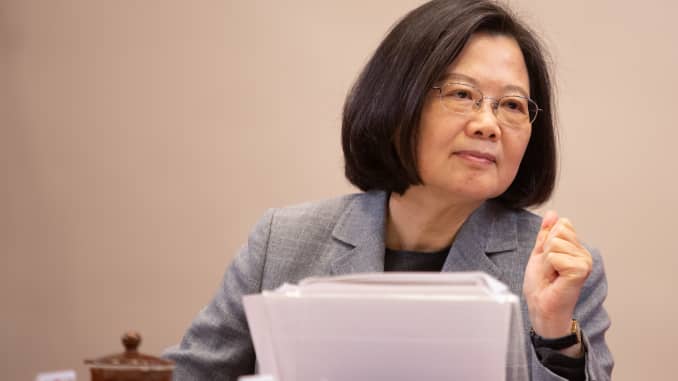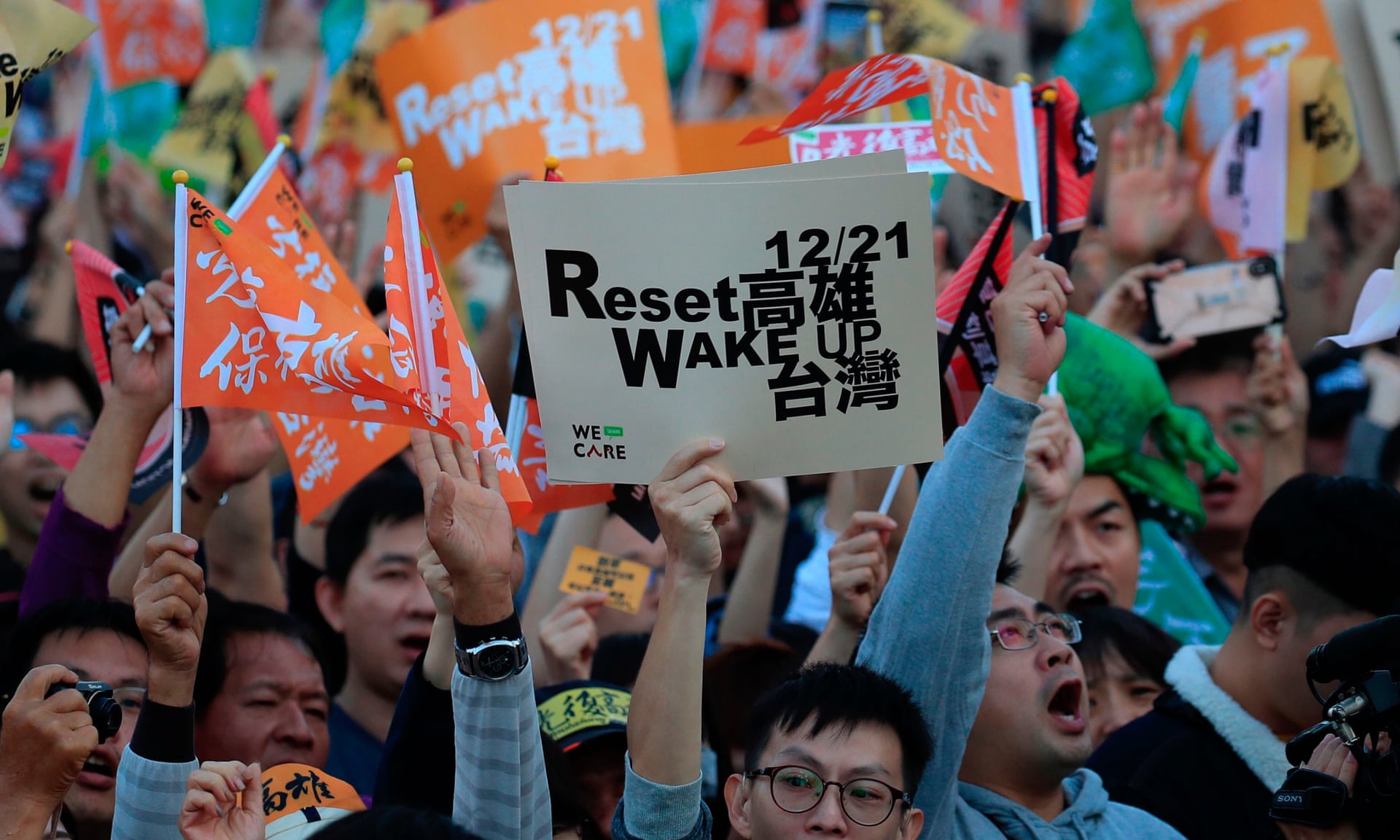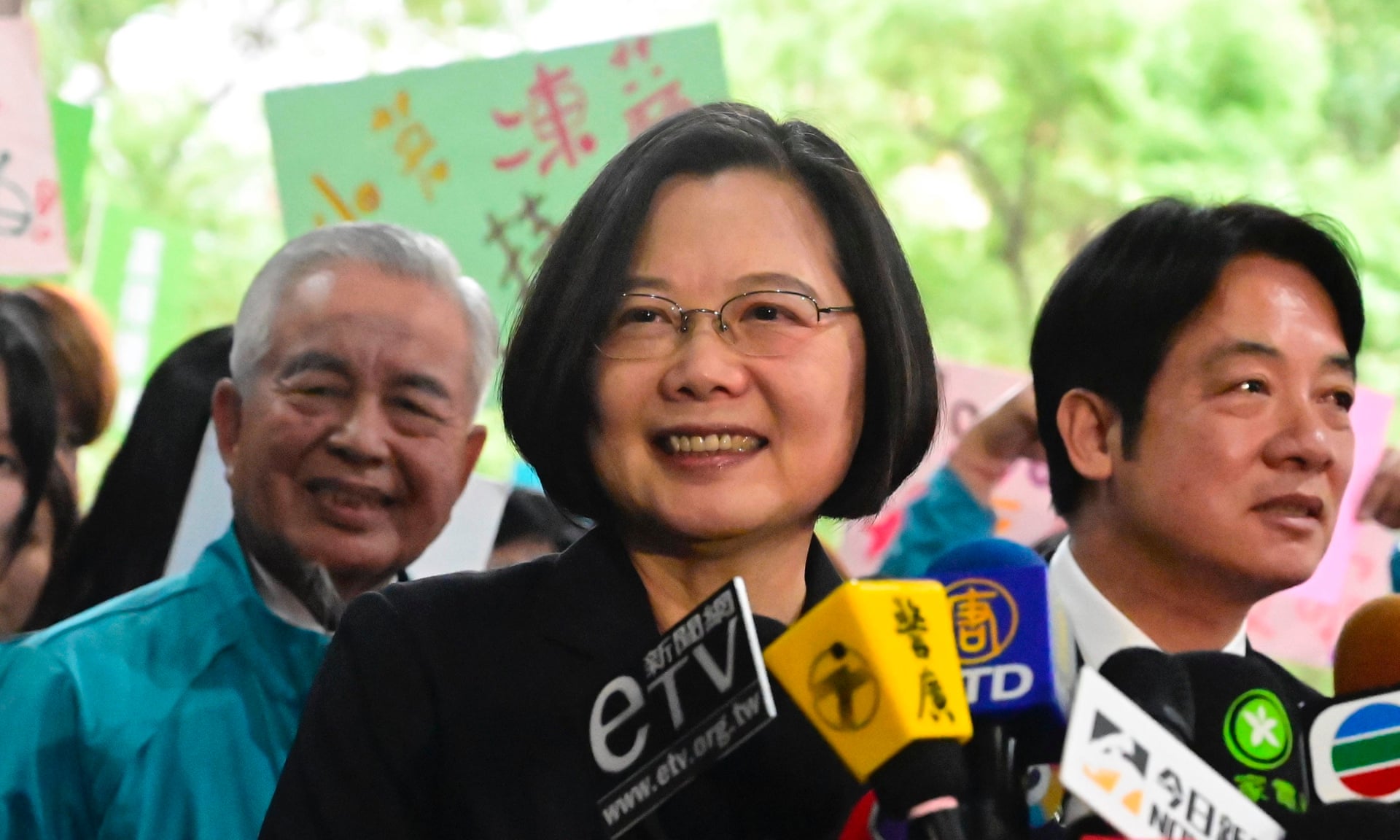AP


Tsai Ing-wen, Taiwan’s president, looks on during a news conference at the Presidential Palace in Taipei, Taiwan, on Saturday, Jan. 5, 2019.
Taiwanese President Tsai Ing-wen has won a second term, signaling strong voter support for her tough stance against China.
Tsai defeated two challengers in Saturday’s election — Han Kuo-yu of the rival Nationalist Party and James Soong of the smaller People First Party.
Han told supporters in the southern port city of Kaohsiung that he had called to congratulate Tsai on her victory.
Voters chose Tsai’s tough stance against China over Han’s arguments for friendlier ties with Beijing, which considers independent Taiwan a renegade province to be brought under its control, by force if necessary.
China’s communist leaders have taken an especially hard line against Tsai since her 2016 inauguration, infuriated by her refusal to endorse its claim that Taiwan and the mainland belong to a single China.
Taiwanese President Tsai Ing-wen has won a second term, signaling strong voter support for her tough stance against China.
Tsai defeated two challengers in Saturday’s election — Han Kuo-yu of the rival Nationalist Party and James Soong of the smaller People First Party.
Han told supporters in the southern port city of Kaohsiung that he had called to congratulate Tsai on her victory.
Voters chose Tsai’s tough stance against China over Han’s arguments for friendlier ties with Beijing, which considers independent Taiwan a renegade province to be brought under its control, by force if necessary.
China’s communist leaders have taken an especially hard line against Tsai since her 2016 inauguration, infuriated by her refusal to endorse its claim that Taiwan and the mainland belong to a single China.
Her victory will likely deepen that deadlock and ratchet up pressure from Beijing.
Taiwan’s President Tsai Ing-wen appeared headed for a landslide victory and a second term on Saturday with more than 70% of precincts reporting election tallies.
Results from the Central Election Commission showed Tsai, with 58% of the vote, holding a healthy lead over her closest challenger, Han Kuo-yu of the Nationalist Party, who had 38%.
Taiwan’s President Tsai Ing-wen appeared headed for a landslide victory and a second term on Saturday with more than 70% of precincts reporting election tallies.
Results from the Central Election Commission showed Tsai, with 58% of the vote, holding a healthy lead over her closest challenger, Han Kuo-yu of the Nationalist Party, who had 38%.
A third candidate, James Soong, had 4%.
The mood was jubilant at the headquarters of Tsai’s Democratic Progressive Party in Taipei, the capital, with supporters cheering as her tally climbed.
The mood was jubilant at the headquarters of Tsai’s Democratic Progressive Party in Taipei, the capital, with supporters cheering as her tally climbed.
At a gathering in Kaohsiung, where Han is mayor, it was much grimmer, with some wiping away tears.
Taiwan has developed its own identity since separating from China during civil war in 1949 but has never declared formal independence.
Taiwan has developed its own identity since separating from China during civil war in 1949 but has never declared formal independence.
Beijing still claims sovereignty over the island of 23 million people and threatens to use force to seize control if necessary.
“I hope every citizen can come out and vote,” Tsai said after casting her vote in Taipei.
“I hope every citizen can come out and vote,” Tsai said after casting her vote in Taipei.
“You should exercise your rights to make democracy stronger in Taiwan.”
Han voted in Kaohsiung, where he is mayor.
For many in Taiwan, months of anti-government protests in Hong Kong, a semi-autonomous Chinese territory, have driven home the contrast between their democratically governed island and authoritarian, communist-ruled mainland China.
President Tsai portrayed the election as a chance to protect Taiwan’s democracy.
“Let us tell the world with our own votes that Taiwanese are determined to defend sovereignty, determined to guard democracy and determined to persist in reforms,” she said at a rally late Friday.
The Nationalist Party’s Han has said Taiwan should be more open to negotiations with China, in contrast to Tsai, who has dismissed Beijing’s overtures.
Han voted in Kaohsiung, where he is mayor.
For many in Taiwan, months of anti-government protests in Hong Kong, a semi-autonomous Chinese territory, have driven home the contrast between their democratically governed island and authoritarian, communist-ruled mainland China.
President Tsai portrayed the election as a chance to protect Taiwan’s democracy.
“Let us tell the world with our own votes that Taiwanese are determined to defend sovereignty, determined to guard democracy and determined to persist in reforms,” she said at a rally late Friday.
The Nationalist Party’s Han has said Taiwan should be more open to negotiations with China, in contrast to Tsai, who has dismissed Beijing’s overtures.
The Hong Kong protests have undermined support in Taiwan for the “one country, two systems” approach Beijing has championed for governing both that former British colony and Taiwan.
Fears of Chinese interference in Taiwan’s politics and an uptick in the economy helped Tsai regain an edge after a dire electoral setback for her Democratic Progressive Party, or DPP, 14 months ago.
“The reason why I vote for her is for upholding the value of Taiwan’s freedom and democracy and that should not be affected by the other side of the strait (China),” Lucy Ting, a college student, said at Tsai’s rally on Friday.
The pro-Beijing Nationalists have struggled to find candidates who can fire up their pro-China supporters and win over young Taiwanese who increasingly favor the DPP.
A second term for Tsai is expected to draw more diplomatic, economic and military pressure from Beijing on the island, in a continuation of Chinese dictator Xi Jinping’s campaign to compel her administration to endorse its myth that Taiwan is a part of China.
Tsai has refused to do so, maintaining that Beijing has no claim over Taiwan, although her government has repeatedly called for the reopening of talks between the sides without preconditions.
Since its transition to full democracy beginning in the 1980s, Taiwan has increasingly asserted its independent identity from China even though it is not recognized by the United Nations or any major nation.
The island of more than 23 million people exercises all the roles of a sovereign nation, issuing its own passports, maintaining its own military and legal system and serving as a crucial hub in the global high-tech supply chain.
Fears of Chinese interference in Taiwan’s politics and an uptick in the economy helped Tsai regain an edge after a dire electoral setback for her Democratic Progressive Party, or DPP, 14 months ago.
“The reason why I vote for her is for upholding the value of Taiwan’s freedom and democracy and that should not be affected by the other side of the strait (China),” Lucy Ting, a college student, said at Tsai’s rally on Friday.
The pro-Beijing Nationalists have struggled to find candidates who can fire up their pro-China supporters and win over young Taiwanese who increasingly favor the DPP.
A second term for Tsai is expected to draw more diplomatic, economic and military pressure from Beijing on the island, in a continuation of Chinese dictator Xi Jinping’s campaign to compel her administration to endorse its myth that Taiwan is a part of China.
Tsai has refused to do so, maintaining that Beijing has no claim over Taiwan, although her government has repeatedly called for the reopening of talks between the sides without preconditions.
Since its transition to full democracy beginning in the 1980s, Taiwan has increasingly asserted its independent identity from China even though it is not recognized by the United Nations or any major nation.
The island of more than 23 million people exercises all the roles of a sovereign nation, issuing its own passports, maintaining its own military and legal system and serving as a crucial hub in the global high-tech supply chain.
Reelected Tsai will face challenges in trying to reform the government and economy and push through unpopular cuts in generous civil service pensions.


